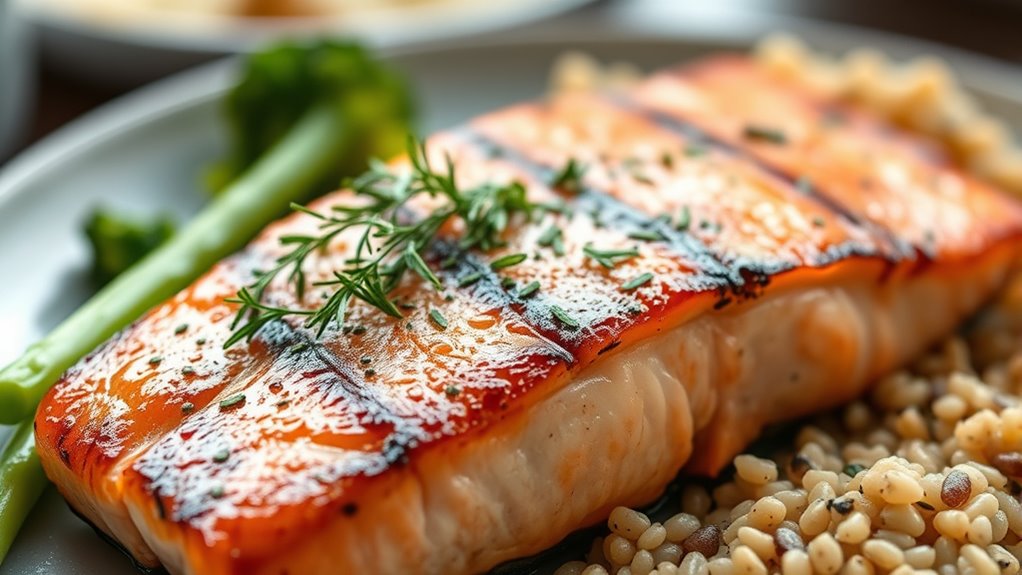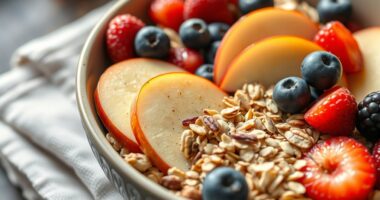As a woman over 40, your protein needs are essential for maintaining muscle, supporting hormonal health, and staying active. Aim to include complete proteins like lean meats, fish, eggs, and dairy in each meal, spreading intake evenly throughout the day. Staying hydrated, exercising regularly, and focusing on nutrient-dense foods enhances muscle preservation and overall wellbeing. If you want to discover more ways to optimize your nutrition and stay strong, there’s much more to explore.
Key Takeaways
- Women over 40 need increased protein intake to support muscle maintenance and prevent sarcopenia.
- Consuming high-quality, complete proteins at each meal optimizes muscle synthesis.
- Hormonal changes require balanced nutrition, including sufficient protein, to support bone health and hormonal balance.
- Regular strength training enhances the benefits of adequate protein consumption for muscle preservation.
- Hydration and a nutrient-dense diet complement protein intake, promoting overall health and functional independence.

As women age past 40, their protein needs often increase to support muscle maintenance, recovery, and overall health. During this stage of life, your body undergoes changes that make it more essential than ever to prioritize adequate protein intake. Muscle preservation becomes a key concern because, as you age, you naturally lose muscle mass—a process called sarcopenia. Without enough protein, your muscles weaken more quickly, affecting strength, mobility, and daily function. Ensuring sufficient protein helps you maintain lean muscle, which is indispensable for staying active and independent.
As women over 40, increasing protein intake is essential for maintaining muscle, strength, and independence.
Hormonal balance also plays a significant role in your nutritional needs after 40. As estrogen levels decline during perimenopause and menopause, your body’s ability to build and repair tissues, including muscle, can be compromised. This hormonal shift can lead to increased fat accumulation and decreased muscle mass if you don’t adjust your diet accordingly. Consuming enough high-quality protein supports hormone production and helps stabilize blood sugar levels, which can mitigate some menopausal symptoms. It also aids in maintaining bone density, reducing the risk of osteoporosis—a common concern for women in this age group.
To effectively support muscle preservation and hormonal health, you should aim for a balanced intake of complete proteins, such as lean meats, fish, eggs, dairy, and plant-based sources like soy and quinoa. Incorporating these into your meals consistently ensures you supply your body with essential amino acids necessary for muscle repair and growth. Spread your protein intake evenly throughout the day to maximize muscle protein synthesis, especially after physical activity or strength training sessions. Staying active with strength training exercises further amplifies these benefits, as it signals your body to preserve and build muscle tissue.
It’s equally important to consider the quality of your diet. Adequate hydration, balanced with healthy fats and complex carbs, complements your protein intake and supports overall hormonal health. Avoid excessive processed foods and sugar, which can disrupt your hormonal balance and lead to inflammation, negatively impacting muscle preservation. Remember, your body’s ability to recover and maintain muscle mass hinges on consistent, nutrient-dense nutrition combined with regular exercise. Additionally, paying attention to adequate protein intake can help mitigate age-related muscle loss more effectively. Incorporating protein-rich foods into your daily routine ensures you meet your increased needs and promotes overall well-being as you age. Recognizing the importance of attention to lifestyle factors, such as sleep and stress management, also plays a vital role in preserving muscle and hormonal balance during this stage of life. Proper hydration and hydration status are equally crucial, as dehydration can impair muscle function and recovery. Moreover, understanding how sound nutrition habits influence overall health can motivate better dietary choices and consistency.
Frequently Asked Questions
How Does Protein Intake Affect Bone Health After 40?
You might wonder how protein intake influences your bone health after 40. Consuming enough protein helps maintain bone density by supporting collagen production, which is crucial for bone strength. It also improves calcium absorption, ensuring your bones stay strong. Adequate protein intake, combined with calcium-rich foods, can slow bone loss and reduce osteoporosis risk, keeping your bones healthier as you age.
Are Plant-Based Proteins Sufficient for Women Over 40?
Plant-based proteins often face myths about their insufficiency, but vegan protein quality can match animal sources with proper planning. You might think you need animal products for complete amino acids, but many plant proteins complement each other to provide all essential nutrients. As a woman over 40, you can meet your protein needs through diverse plant foods, ensuring bone health and muscle maintenance without relying solely on animal proteins.
What Are the Best Protein Sources for Women With Allergies?
When selecting protein sources for women with allergies, you should look for allergy-friendly options and plant protein varieties. Opt for hypoallergenic options like quinoa, chia seeds, and lentils, which are less likely to cause reactions. You might also try rice protein or pea protein powders, as they’re often well tolerated. Always read labels carefully and consider consulting with a healthcare professional to make sure your protein sources suit your allergy needs.
How Does Menopause Influence Protein Requirements?
Like the shifting tides of a familiar sea, menopause brings hormonal changes that influence your protein needs. These changes can accelerate muscle loss, making it crucial to increase your intake. You might find that prioritizing high-quality proteins helps preserve muscle and maintain strength. By adjusting your diet, you support your body through this passage, ensuring you remain resilient and vibrant, like a steadfast lighthouse amid changing waters.
Can Increased Protein Intake Improve Muscle Recovery in Women Over 40?
Increasing your protein intake can noticeably improve muscle repair after exercise, especially as you age. When you consume more protein, your body absorbs it efficiently, supporting quicker recovery and reduced soreness. This benefits women over 40 by helping maintain muscle mass and strength. Focus on high-quality proteins and balanced meals to optimize protein absorption, ensuring your muscles recover effectively and keep you active and healthy.
Conclusion
As you consider your protein intake, you might be surprised to find how small changes can make a big difference. Coincidentally, many women over 40 notice improvements just by incorporating more lean proteins into their meals. It’s almost like your body was waiting for this simple shift. So, why not start today? Your future self will thank you for embracing these easy habits now, turning everyday moments into powerful steps toward better health.









